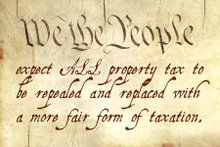Fred McCarthy, editor of Indy Tax Dollars, is a 1948 graduate from Indiana University with a bachelor's degree in Government (PoliSci) with minors in economics and psychology. He's retired now and represented various taxpayer and business organizations before local governmental bodies and the Indiana General Assembly for forty years. Two Indiana Governors awarded him a Sagamore of the Wabash.
From Indy Tax Dollars
July 5, 2008
It's time
Some people - a few we have known and trusted for years - have campaigned for the complete elimination of the property tax in Indiana for some time. We admit to having been somewhat hesitant in the past, but we do think this morning's paper inadvertently gives very strong support for the proposal to get rid of this tax. (We say "inadvertently" because the same paper has consistently supported "fixing" the present system.)
The front page headline says: "Revised assessments bring new problems." Not quite accurate. Maybe "worsened" or "increased" instead of "new." But the fact is that the problem of fair and equitable assessment is not new. It is the primary reason that the suggestion for the elimination of this tax makes sense.
In years past, the assessment base was the replacement cost of the improvements (buildings), less depreciation, plus the value of the land. (This is basically the method referred to in the present assessment manual as the "Cost" approach. See below.) All properties were assessed by this formula, with various adjustments allowed. In their wisdom, the courts struck this system down, and demanded something more "equitable."
The current assessment manual as adopted by the Indiana Department of Local Government Finance (DLGF) presents three approaches to the assessment procedure: Cost, Sales Comparison and Income. Without going into detail and without regard to the merits of any of the three, we would suggest that the very act of using three separate and distinct methods of valuation would, at least, inhibit the possibilities of equity.
In the present situation the taxpayers have already been bamboozled with the concept that a permanent "cap" on tax liability can be had by applying a fixed percentage to a very flexible factor. One only has to look at the morning paper to realize how very flexible that factor is. A "...flood of appeals..." will result in a "flood" of variations in assessments, automatically followed by variations in the "cap." It seems fairly obvious that, if appeals force the direction downward now, the next reassessment can reverse that direction.
The problem as we see it is that efforts to reformulate the operation of the property tax, whether it be assessment practices, levy limitations or whatever, have always wound up with the taxpayer playing second fiddle to the "needs" for public spending. When those "needs" do not coincide with the results of the revenue raising methods, the "needs" always end up with priority. Having spent a good many years observing this phenomenon, we now must come to the conclusion that it is unchangeable.
Logic would seem, therefore, to dictate that protection of the taxpayer demands the complete elimination of this tax."
Monday, July 7, 2008
Indy Tax Dollars blog weighs in with the case for property tax repeal
Posted by
M Theory
at
Monday, July 07, 2008
![]()
Subscribe to:
Post Comments
(Atom)




No comments:
Post a Comment